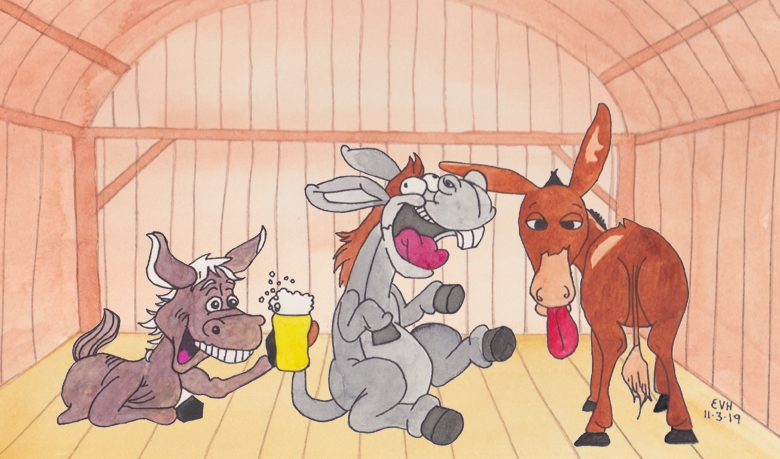
Jataka 183
Vālodaka Jātaka
The Leftovers
as told by Eric Van Horn
originally translated by William Henry Denham Rouse, Cambridge University
originally edited by Professor Edward Byles Cowell, Cambridge University
This is a story about alcohol consumption. In the Jātaka Tale, the more civilized beings consume alcohol but are able to maintain their decorum, but those with undisciplined minds cannot.
This does not really resonate with the Buddha’s teaching. The fifth Precept is not to consume substances that dull the mind. It is not because there is anything inherently wrong with consuming alcohol or drugs, but that intoxication so often leads to harmful behavior.
“This sorry drink.” The Master told this story while he was at Jetavana. It is about 500 people who drank cheap liquor.
At Sāvatthi, we learn, there were 500 people who had left the defilements of a worldly life to their sons and daughters and gone to live as lay people under the Master’s preaching. Of these, some were stream-enterers, some were once-returners, and some were non-returners. So all of them had attained at least the first stage of awakening.
They had also brought with them their attendants. Thus they had 500 people waiting on them. The attendants would bring them toothbrushes, mouth-water, and garlands of flowers. These attendants used to drink cheap liquor. After their meal and a nap, they used to run down to the Aciravatī River, and on the river bank they would wrestle like Mallians (a tribe of professional wrestlers), shouting all the time. But the 500 lay followers were quiet. They made very little noise, and they cultivated serenity.
The Master happened to hear the attendants shouting one day. “What is that noise, Ānanda?” he asked.
“The lay people’s attendants. They drink cheap liquor,” was the reply.
The Master said, “Ānanda, this is not the only time these attendants have drunk cheap liquor and caused a great ruckus. They used to do the same in days gone by. And likewise these lay followers were just as tranquil as they are now.” So saying - at his request - the Master told this story of the past.
Once upon a time, when Brahmadatta was the King of Benares, the Bodhisatta was born as the son of one of his courtiers. He became the King’s adviser in all things both worldly and spiritual. Word came to the King of a revolt on the frontier. He ordered 500 cavalry horses to be made ready. The army was complete in its four parts (elephants, horses, chariots, and infantry). With these he set out. He put down the rebellion, after which he returned to Benares.
When he got home he gave this order, “The horses are tired. Let them have some sweet fruit and some fine liquor to drink.” The steeds took this delicious drink and then retired to their stables. There they stood quietly, each in his stall.
But there were leftovers from the fine fruit, skins and rinds and seeds. These leftovers had nearly all the goodness squeezed out of them. The keepers asked the King what to do with them. “Knead them up with water,” he commanded. “Strain them through a towel, let the mixture ferment, and give it to the donkeys who carried the horses’ fodder.”
The donkeys drank up this wretched stuff. It made them go mad. They galloped about the palace yard bellowing loudly.

Figure: “It Made Them Go Mad!”
From an open window the King saw the Bodhisatta and called out to him. “Look there! See how mad these donkeys are from that sorry drink! How they bellow, how they prance about! But those fine thoroughbreds that drank the fine liquor, they make no noise. They are perfectly quiet and do not jump not at all. What is the meaning of this?” And he repeated the first stanza:
“This sorry drink, the goodness all strained out,
Drives all these donkeys in a drunken rout,
The thoroughbreds, that drank the potent juice,
Stand silent and do not prance about.”
And the Bodhisatta explained the matter in the second stanza:
“The indecent, though he but taste and try,
Is frolicsome and drunken by and by.
He that is gentle keeps a steady brain
Even if he drain most potent liquor dry.”
When the King had listened to the Bodhisatta’s answer, he had the donkeys driven out of his courtyard. Then, abiding by the Bodhisatta’s advice, he gave alms and did good until he passed away to fare according to his karma.
When this discourse was ended, the Master identified the birth as follows: “At that time these attendants were the 500 asses, these lay followers were the 500 thoroughbreds, Ānanda was the king, and I was the wise courtier.”
